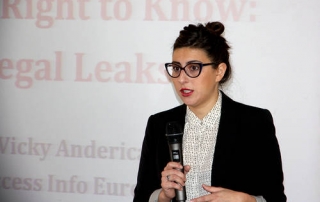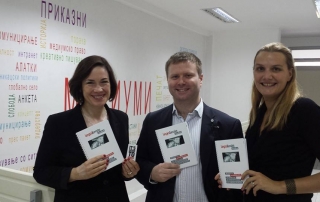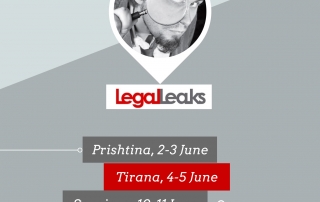EMPOWERING JOURNALISM THROUGH
THE RIGHT OF ACCESS TO INFORMATION
THE LEGAL LEAKS TOOLKIT HELPS JOURNALISTS OBTAIN
INFORMATION USING ACCESS TO INFORMATION LAWS
Why is the right of access to information important for journalism?
A Guide for Journalists on How to Access Information
The Legal Leaks Toolkit, developed by Access Info Europe and n-ost, helps journalists access information using Access to Information laws. The Toolkit is available in a generic international version and can be adapted to the legal framework of any country. The existing national versions, translated into local languages, are available below. You can also read more below about our training programme and about how to contact
the Legal Leaks Help Desk.
Why do media experts think access to information is important?
Journalists, activists, and media experts speak about the importance of access to information in their daily work. Watch all interviews here!
That little detail in the relationship between journalists and sources, that little one, is so important that could change the way in which we tell stories.
It is extremely important that there is this mechanism that you can use as a journalist to say “Hang on a minute, you need to give us this, because we have a right to know”.
It’s a great way to get stories, it’s a great way to fin out what governments in particular are doing, it’s a great way to find out where money goes, it’s a great way to prove accountability.
The right of access to information is very important for the journalists’ work; it’s important for everyday work, but it’s even more important for investigations.
Journalism is about investigation, it’s about asking questions; but it’s about documents as well, as a proof for questions, as a proof for answers
Basically, I need access to information to do my job as someone who is supposed to ensure the accountability of politicians, of public officials.
Cover photo: European Parliament via Flickr (CC BY-NC-ND 2.0)
EMPOWERING JOURNALISM LATEST NEWS
Legal Leaks training in Ankara: Empowering Turkish journalists to access information from European institutions and public bodies in Europe
This article was originally published by UNESCO. What are the grants received from the European Union (EU) in Turkey? Who are the beneficiaries? How were they decided? And, who lobbied in those decisions? Accessing this type of information can be a source of interesting and original stories for journalists. European Union institutions have information about each and every country, not
Legal Leaks training in Skopje
Skopje, 20 October 2014 - In the context of the South East Europe Media Forum, a regional conference organized with the support of UNESCO and the European Commission, Access Info Europe and UNESCO held its 6th Legal Leaks training seminar in the South East Europe region in collaboration with the Macedonian Institute for Media. The training took place in Skopje
Legal Leaks training in Podgorica focuses on media self-regulation and access to information
Podgorica, 14 June 2014 - "There is a weak culture of investigative journalism in Montenegro, with young journalists not being encouraged by editors to use the access to information law," stated participants in last week’s Legal Leaks training in Podgorica. Long timeframes for responding to requests for information and complex appeals procedures were also concerns raised by the participants in
Legal Leaks training in Belgrade: Truth seeking requires skills
Belgrade, 18 June 2014 - Belgrade was the fifth and last stop of the Legal Leaks training tour for media professionals in South East Europe. The workshop held on 16 and 17 June 2014 was opened by Rodoljub Sabic, Commissioner for Information of Public Importance and Personal Data Protection in Serbia, who highlighted the importance of journalists for public debate
Legal Leaks event in Sarajevo trains media professionals to data journalism
Sarajevo, 12 June 2014- Data journalism is opening up new possibilities for journalists to disclose new types of stories and to present complex information to readers through infographics. This new form of journalism is ever more popular as an addition to traditional journalism. In a world of ever-growing flow of data, data-driven journalism is becoming an essential part of journalistic
Albanian journalists trained to use Legal Leaks in their daily work
Tirana, 6 June 2014 - Is the Albanian law on access to information useful in the daily work of Albanian journalists? Is its implementation a pending issue? Should journalists play a greater role in implementing the law and in encouraging the rest of society to use this right? To advance debate on these issues, a Legal Leaks training seminar was




